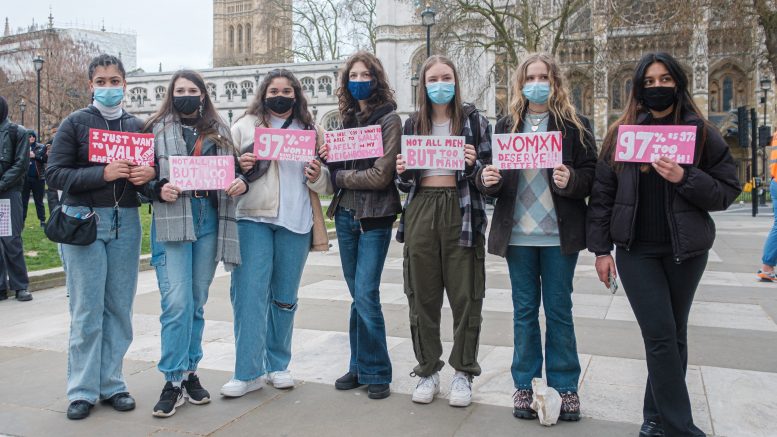Following the deaths of Sarah Everard and Sabina Nessa, the focus on women’s safety is mainly aimed at their experiences at night, but what about workplace harassment and women’s safety during the day?
Regardless of age, women and girls around the world have to fear the possibilities of sexual assault, harassment, and in some cases murder, daily. With the deaths of both Sarah Everard and Sabina Nessa within the span of 7 months, the emphasis on women’s safety has come into question. Who can we trust?
In the UK specifically, the past couple of months have been filled with distressing news regarding women being spiked on nights out at various different clubs, not only in their drinks but through needles too. As reported in the Independent, Nottinghamshire Police are investigating 12 separate reports of people being spiked within the last month alone. This led to a widespread boycotting of clubs by women in the hopes that they would improve security and safety for attendees. But is this the only thing that can be done?
- Read more here on the ‘Girls Night In’ boycotts
- Read more here on what men can do to make women feel safer
The loss of both Everard and Nessa has shown that the focus on women’s safety is mainly aimed at their experiences at night, which surprisingly isn’t the only time women are targeted. From indecent exposure outside schools, sexual assault in the workplace and groping on the tube in rush hour, the day time hardly differs from the night.
A Recent example of workplace harassment includes the revelation by MP Caroline Nokes who accused Stanley Johnson, PM Boris Johnson’s father, of smacking her bottom in 2003 at a Conseravtive conference party, as mentioned in The Guardian.
Following such an incident, Caroline Nokes was questioned by many on why she didn’t report the incident to anyone, in which she mentions that her “first question would be to who?”. She also mentioned thinking of the consequences as “even 18 years later you can see people trying to turn it back on me, victim-blaming and shaming.”, as reported by The Guardian.
Despite people’s doubts and Stanley Johnson’s denial of even knowing Caroline Nokes, journalist Ailbhe Rea from The New Statesman came forward to discuss how she was also sexually harassed by Stanley Johnson in 2019. Mentioning in a tweet how she was “grateful to Caroline Nokes for calling out” Stanley Johnson.
In an elaborate article on The New Statesman, Ailbhe Rea expressed her feelings about Caroline Nokes’ bravery and peoples reaction to such an incident as well as her own experience with Stanley Johnson. Finishing with “ But I see this as Stanley Johnson’s problem, not mine or Nokes’s.”. Further expressing how tolerant with such behaviour we have become as a society as “ I have no doubt Stanley Johnson will attend many more receptions at Conservative conferences. I just hope that, next time, he keeps his hands to himself. Hey ho.”.
This is an alarming matter that needs to be sorted immediately. A study conducted by UN Women UK analyses sexual harrassment against women through a survey with over 1000 female reposndents.

How will any of this change if Prime Minister Boris Johnson himself, as well as many of his peers have been accused of sexual harrassment themselves?
Boris Johnson was accused of groping Journalist Charlotte Edwardes, who came out and said he had touched her inner thigh at an event in 1999, as reported in the Times. After the statement by Edwardes was released he had claimed that this was untrue. In response Edwardes states that “If the prime minister doesn’t recollect the incident then clearly I have a better memory than he does”.
Currently standing in 2021, and facing the two major attacks against Sarah Everard and Sabina Nessa that resulted in death, it’s evident that action needs to be taken by the government. The PM has been very dismissive of creating a new law that would make public sexual harassment a crime earlier on in the year, as he sees that there is plenty of existing legislation, as reported in The Guardian. Showing that he has failed to create a safe environment for women around the country, and his colleagues.
As shown in the statistics above provided by UN Women UK, many women don’t report cases of sexual harassment, assault or rape, be it out of embarrassment, lack of resources or the fact that when seeking help they are blamed despite being victims. Bella (Alias), Student, 22, recalls her experience being sexually harassed and why she decided to not report the crime “It was by a close friend, someone I thought I could trust. The reason I didn’t report it was because they were the same gender as me”.
A victim of sexual harassment, Charlotte (Alias), 23, student, retells her recent experience of witnessing indecent exposure in public and why she didn’t report the crime despite intending to:
“ I was walking home when I saw a van, inside there was a man touching himself. I was shocked because it was at around 4pm, I took a picture of the license plate and quickly ran home. I tried reporting the crime online but the Met police online reporting system had asked for many specific details that I couldn’t answer and some questions were very personal to myself which I didn’t want to be involved in.”
Regardless of whether women report such crimes or not, it’s clear that time after time they are often not taken seriously or have to go through multiple hurdles just to be heard out.
The system in which women have to report such crimes needs to be fixed and as a society the standard should be that sexual harrassment regardless of how miniscule it may seem, should be taken seriously.
Words: Hannah Ozkadi | Subbing: Tia Janowski.


Be the first to comment on "Are women only targeted at night?"